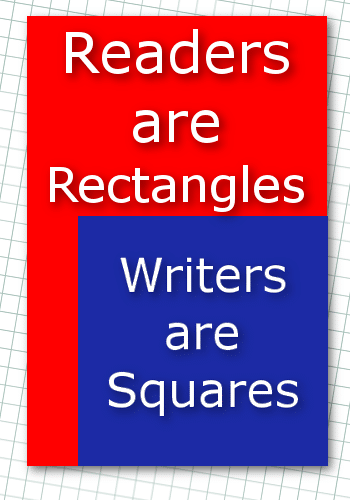All squares are rectangles, but not all rectangles are squares.
Take that axiom from grade-school math class and replace “squares” with “writers” and “rectangles” with “readers.” It holds just as true. There is no supplier-customer relationship that flows in a single direction. Writers freely partake of the wares of their peers, and most are drawn to writing in the first place by having been avid readers themselves.
Reading as a writer
“I don’t read like I used to.” You hear this a lot from authors. The time spent wandering mental landscapes of other people’s work has given way to mulling scenes and working out plots of our own incubating worlds. The same portion of the brain that pondered the “what ifs” of an existing story’s world is now being put to use envisioning the next. That gray matter needs its rest from time to time, and just as a runner can’t rest his legs by cycling, sometimes an author can’t rest his writing mind while reading. There are household chores that need attention, children and pets that need guidance, day jobs and side jobs, and that faucet that needs to be replaced. Reading time and writing time often get lumped together, such that one ends up robbing from the other.
But that’s not the interpretation of “I don’t read like I used to” that caught my attention recently. I notice more and more that when I read, I edit. I’m no copyeditor; odds are that any typo that makes it past the pros slips my net as well. But style, flow, clarity, choice of prose and metaphor, all are fair game for silent critique as I read. Is someone over-explaining the mundane, or pulling out thesaurus words that don’t fit the section? Did we need the paragraph describing the city’s economic history before we set foot within its walls? Did this author just use two adverbs in a dialogue tag?
The real kicker for me is the worldbuilding. Anyone who keeps up with this blog knows it’s an area of special interest to me, and one I work hard to translate into my own writing. I wonder how a city that’s stood for a thousand years has no credible army. I cringe when I read about a foreign culture and see past the thin veil of made-up words to see the ugly caricature of a real-world people. I puzzle over bizarre creatures whose habits and biology, as described, seem incompatible with existing near humans and in such large numbers. It can also be annoying when visual details are omitted from the narrative (which the POV character sees) just to create false suspense, but I suppose that isn’t quite a world-building problem.
Writing as a reader
So these are the sort of qualms I keep in mind when I edit my own writing. If I were the one reading it, what might be bothering me? It’s fine to let the reader connect the dots, and not spell everything out for them. But those dots, when connected, ought to form a proper picture. But seeing how other authors go about their craft is informative, even when we don’t always agree with the choices they make.
I’m not sure any writer could completely give up reading, no matter how little time might be left in their schedule. I’m not sure what that would even looks like.


I tend to edit as I read. Also, I’m trying to switch from a plethora of descriptive words to shorter, more terse writing. It’s hard giving up all those lovely descriptive words and phrases.